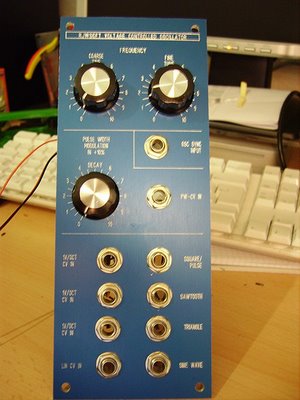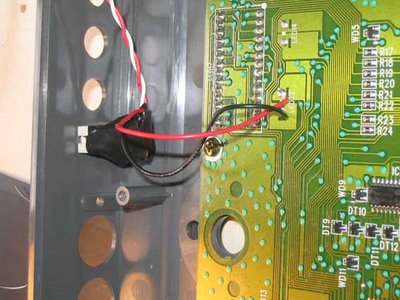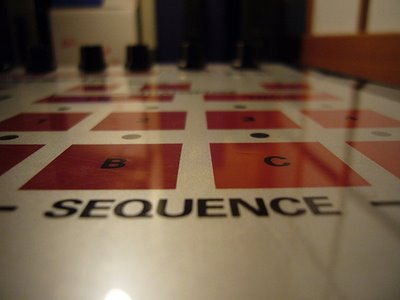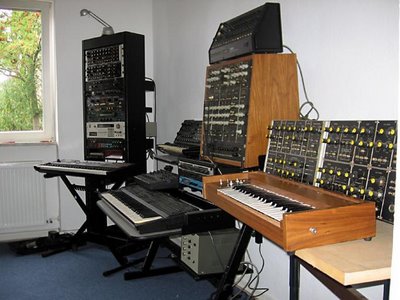Sunday, August 27, 2006
Tangerine Dream Live on Barock 3 in 1976 on YouTube
via Frederic
Update via the comments:
REgardging the synth in the opening shot above the mellotron.
"The synth is a PPG monosynth - a 1002 or 1020 I think. There was a post on this blog about it a few months ago.
Lots more vintage TD on Youtube, it all seems to be from the same German TV program. Just search for 'Tangerine Dream Signale'."
TR-808 MIDI Interface
 Title link takes you there.
Title link takes you there. "The TR-808 MIDI retrofit enables your Roland TR-808 to be synchronized with other MIDI devices and work like polyphonic velocity sensitive MIDI drum expander. More over all original features of the TR-808 are not changed.
Features:
-Sequencer of TR-808 can be synchronized by internal tempo generator or by MIDI clock.
-Start / Stop (transport functions) can be controlled by panel button or by "Start", "Stop" and "Continue" MIDI transport commands or both ways simultaneously.
-Tone generators of TR-808 can be triggered by internal sequencer, by MIDI notes or both ways simultaneously.
-Response of tone generators to "Velocity" of Note-On MIDI commands is fully dynamic.
-79 MIDI notes (12 to 90) are acceptable. It can be assigned to each of them independently:
- any of TR-808 tone generator (or none generator)
- basic signal level and dynamic range (resolution up to 126 steps) of assigned tone generator
- CM/GM/GS/XG drum map is factory predefined.
- Number of MIDI channel for MIDI commands receiving is programmable by user, channel 10 is factory predefined.
- MIDI interface can be turned off, TR-808 then works exactly as without installed interface.
- Easy and non-destructive installation into TR-808.
Pong on the MPC1000
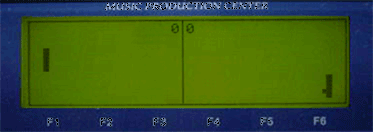 Nice. Title link takes you to the post on Music Thing.
Nice. Title link takes you to the post on Music Thing.Via the forum this was found on:
"Rumors are now that Wakai is negotiating with Nintendo to get The Legend Of Zelda (NES version) on the mpc2500 to boost sales. Nothing official as usual."
M3X - New Flickr Shots
 flickr GeschnittenBrot. Title link takes you to more shots of the MacBeth M3X.
flickr GeschnittenBrot. Title link takes you to more shots of the MacBeth M3X.
Synthi VCS3 Sample
Title link takes you to a sample of the Synthi VCS3 by REwire on the VSE fourm. Details saved here for when the thread goes into limbo:
"My Synthi VCS3 has been hard to play in tune since I got it but recently I did an overhaul on cleaning, lubing and internal pot adjusting it and wow, suddenly it all came togther in tune - all 3 oscillators holding pitch together.
Unlike my "Bit By Bit" tune with a modular patch that allowed 5 oscs to be panned separately, these three are crammed together into the same filter and mono output. The effect is a war of oscs, beating against each other for supremacy.
This is a one minute solo piece with first one osc, then two, then three all playing the same thing: 840K mp3
When VA's can do this I'll submit."
mp3 saved here for posterity.
"My Synthi VCS3 has been hard to play in tune since I got it but recently I did an overhaul on cleaning, lubing and internal pot adjusting it and wow, suddenly it all came togther in tune - all 3 oscillators holding pitch together.
Unlike my "Bit By Bit" tune with a modular patch that allowed 5 oscs to be panned separately, these three are crammed together into the same filter and mono output. The effect is a war of oscs, beating against each other for supremacy.
This is a one minute solo piece with first one osc, then two, then three all playing the same thing: 840K mp3
When VA's can do this I'll submit."
mp3 saved here for posterity.
Saturday, August 26, 2006
Korg DW8000 in Original Box
 Not the best shot in the world, and not exacty super spectacular, but check it out. Someone is selling a Korg DW8000 in it's original box. That styrofoam sure stays white. : )
Not the best shot in the world, and not exacty super spectacular, but check it out. Someone is selling a Korg DW8000 in it's original box. That styrofoam sure stays white. : )
Interview with Jean Jacques Perrey
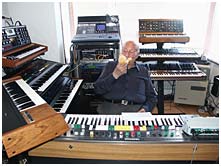
Is that a sammich in his hand? Click here for more shots and links to the interview (links are on the left when you get there). Also, don't forget his first US tour; it starts this Sunday, that's tomorrow, in Seattle.
via Frederic
James Tenney RIP
 "In American Music in the Twentieth Century, composer and music critic Kyle Gann wrote, .When John Cage, who studied with Schoenberg, was asked in 1989 whom he would study with if he were young today, he replied, 'James Tenney.''
"In American Music in the Twentieth Century, composer and music critic Kyle Gann wrote, .When John Cage, who studied with Schoenberg, was asked in 1989 whom he would study with if he were young today, he replied, 'James Tenney.'' A performer as well as a composer and theorist, Tenney was co-founder and conductor of the Tone Roads Chamber Ensemble in New York City (1963-70). He was a pioneer in the field of electronic and computer music, working with Max Mathews and others at the Bell Telephone Laboratories in the early 1960s to develop programs for computer sound-generation and composition. He has written works for a variety of media, both instrumental and electronic, many of them using alternative tuning systems.
Tenney is the author of articles on musical acoustics"
Title link takes you to James Tenney's bio. Via Peter Grenader on AH:
"I've just received word that an American music maverick and electronic music
poineer James Tenney has passed after a strident six month long battle with
cancer. He will be missed for his extraordinary contribution to 20th century
music, a career that spanned over over 50 years, and as one of the most
genuine and generous people in the field. A brief biography of Tenney can
be found at: link"
Midge Ure Talks MOOG on YouTube
Midge Ure of Ultravox. Love the accent and how he pronounces Moog. He talks about how they still used old synths at the time and at about 15 years old the Mini is somewhat of an antique. He states that you can't get synths like this anymore. Little did he know the Voyager would be coming. Pretty cool. The Minimoog provided the bass for Vienna. via Frederic. YouTube via playthatbeat.
Chrome by Feraillus
 Remember this Elektron Monomachine track? Title link takes you to the full EP available for download (track links on the top right when you get there). Great showcase of the Monomachine and great tracks in general.
Remember this Elektron Monomachine track? Title link takes you to the full EP available for download (track links on the top right when you get there). Great showcase of the Monomachine and great tracks in general.
Behind MiniMusic's BeatPad
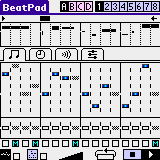 I absolutely love MiniMusic's BeatPad. You can see some of my previous posts on BeatPad here. Here's a post of BeatPad driving a Moog Voyager and Roland TR-909.
I absolutely love MiniMusic's BeatPad. You can see some of my previous posts on BeatPad here. Here's a post of BeatPad driving a Moog Voyager and Roland TR-909. Simon Gatrall sent the following to AH. It's great to know where the design came from.
"I based the analog line portion on the EML 400, and the drum portion on an X0X style machine. I designed Beatpad and Minimusic did the coding/support/etc.
I have a prototype of the "analog" portion of the sequencer built in Max, but it doesn't have the same pattern storage tools or the start point changing.
Some day I'd like to reproduce or expand on the concept for a Mac based version.
I also ran a company called Swivel Systems which developed a General MIDI add on for earlier Palms, but I have to say that the concept of Beatpad was what got me started with the whole thing."
Cheers to Simon and MiniMusic for creating such a cool piece of software. Now we just need a Mac and PC version for the tablet. Title link takes you to MiniMusic.
M-Audio Unniversity

"Welcome to M-Audio University. M-Audio University offers free online classes and tutorials that help you get the most out of your M-Audio gear. Learn software and studio tips and tricks from the experts. Tuition is free with a simple registration. M-Audio University is pleased to present the following classes and tutorials at this time[Ableton Live, General Audio and Recording, Pro Tools M-Powered 7]. New materials are being added continually, so be sure to check back often."
Pretty cool. Title link takes you there.
Friday, August 25, 2006
Automat and the ASE MCS70

Another via Frederic. Automat is an old electronic album from 1978 that featured the ASE MCS70. You can read more about the album here where you will find a number of samples. You can find more on the MCS70 on Synthmuseum.com where the image below was pulled from.
via the Automat page:
"When I saw my incoming mail box in 2000/October/01 I had a great surprise. A message from Mario Maggi (the man who idealized and constructed the MCS70, the sinthesizer used to do "automat"). Once again, my thanks to Sergio A. Simões. He found the Mario Maggi´s e-mail, contacted him, and told him about my page. To receive a message from Mario Maggi and all creators of "automat" is one of my great objectives. Naturally, I had (and still have) thousands of questions. We change a few messages, and I´ll continue changing. Now you can see a few questions. The first message was from Mario Maggi to answer questions for Sergio. The main subject is about MCS70, but there is a lot of information regarding 'automat'." Thanks Frederic!
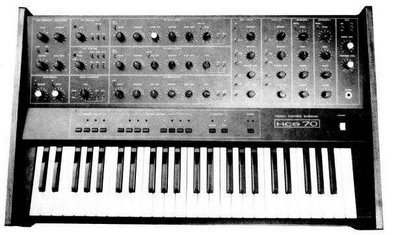
SEKU Analog Sequencer
Title link takes you to a couple of shots. Via Sigma:
"We are an Ambient/Electronic-music duo from Finland and have something we would like to share other synth/DIY-fans.
SEKU is a self made 2 x 16 step sequencer with slider-pots as in ARP-sequencer. Length of the sequence can be set to N by patching PULSE-OUT from N+1 step to RESET-IN jack. When no clock is connected to CLK-IN sequencer can be manually stepped from STEP button.
Each row has CLK-IN, CV-OUT, GATE-OUT and RESET-IN jacks. You can mute any one of the 1-16 steps with the STEP-MUTE switch. Each step has also a PULSE-OUT jack.
Slider potentiometers for STEP-CV adjusting are used because they are more informative.It is also possible to draw waveforms with the sliders when SEKU is clocked with audio-rate clock.
SEKU and Korg MS10 combination is something very special. When you patch first row CV-OUT to Korg VCO-CV-IN and second row CV-OUT to Korg CUTOFF-FREQ-IN (modulation wheel is patched to INITIAL-GAIN-IN so that VCA is open) you always get something very musical.
Here is YouTube-link for video-demo of SEKU-MS10 combination with additional noise-drum from Roland S100M: link
Our new CD "Music With Analog Improvised Soundscapes" is based on this SEKU-MS10 combination and can be purchased from CD-Baby: link"
Pink LEDs
Nice. Via Tec Assistance, "here's a pulse programmer i recently built with the new issue pink leds.I believe they are the fruition of some Philips research which is able to combine the materials such that other colours will become available.I guess the rainbow is coming!"
EMS Synthi AKS Restored by CMS on The Bay
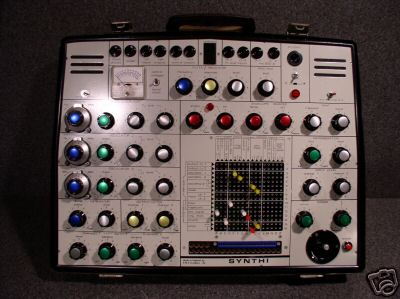
A couple of shots pulled from this auction. Restored by CMS. Currently at 10 bids and $6200.
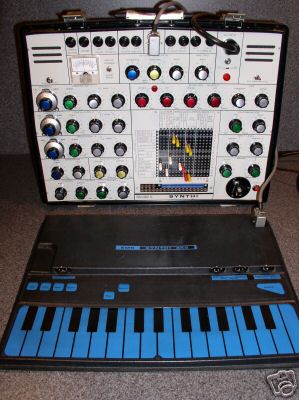 Details:
Details:"Up for auction here is a fully restored Synthi AKS made by EMS of London, in excellent condition complete with a fully functional KS keyboard. The unit is all original and is not a clone, reissue or reproduction. Serial #’s on the synth and the keyboard match. This Synthi has been fully restored by Phil Cirocco of CMS / DiscreteSynthesizers (yes it's me). Google the "Novachord Restoration Project" for a restoration example. I hate to give up my special secret weapon of aural destruction, but it's the usual story, I'm trying to buy a house. This unit is dangerous through a very large PA system.
Standard Synthi AKS features will not be listed here. I assume you know them if you are looking for one.
Synthi A Features: All the electrolytic (wet) capacitors have been replaced. Wet caps dry out after 15 to 20 years. There are numerous wet caps used in the Synthi and they all must be replaced. The power supply is the more reliable version 2 and has been fully rebuilt. It has brand new speakers and a new reverb tank. It also has 14 new silver knob inserts. New power switch and AC inlet. The knobs and front panel are in excellent condition. The pin matrix is also in brand new condition. The joystick has no play and stays in position. The meter plastic has no scratches. All circuitry and mechanicals are fully functional and have been calibrated to factory specs. This is a rare opportunity to buy a Synthi AKS that needs no post-auction servicing.
The KS keyboard is in excellent condition and has been totally rebuilt and calibrated. The sequencer is fully functional and the meter indicates the sequencer location. The keys, transpose and random touch switches all work fine. The touch sensor also is fully functional and is normalized through input channel 2. As with all AKSs, the sequencer output is routed through the joystick output, and the real time CV out is routed through input channel 1. Usually, when you buy an AKS, the KS keyboard is not functional. It’s very labor intensive to diagnose and repair it’s primitive computer, but this keyboard also has been totally restored and is guaranteed fully functional.
The outer case is in good condition with the usual light scratches, nothing deep. All the plastic parts of the suitcase are totally intact, no rips. The outside chrome hardware has tarnished and has some rust and pitting but probably could be brought back with some steel wool or jewelers polish. The latches all work. The lid is in very good condition and the blue plexiglass EMS emblem is in very good condition.
Comes with a brand new power cord, keyboard cable and 15 brand new matrix pins."
Mighty nice.
via ag
DIY Synth
Pinky
 Title link takes you to more info on Pinky, a DIY synth.
Title link takes you to more info on Pinky, a DIY synth."pinky has mostly cgs boards - gate sequencer, with preset and cv, digital noise, 2 tube vcas, steiner vcf, 2 bandpass filters, passive ring modulator, envelope generator, joystick-nipple, super psycho lfo, psycho lfo and dc mixer. cheers Ken! Also Paia dual VCOs and modulator"
via Frederic
Thursday, August 24, 2006
Electronik Supersonik on YouTube
Behringer Synth
 Title link takes you to the Behringer Synth page on Synrise.
Title link takes you to the Behringer Synth page on Synrise. "These synth was built in 4865 hours of hard work by the 16 years old Ueli Behringer founder of the studio equipment firm BEHRINGER in ca. 1982. It seems to be an additive synthesizer if the 16 faders on the left side controls the spectrum of the first 16 harmonics."
via Frederic
Yamaha CSDX
Wednesday, August 23, 2006
Vocoder - What happens now? on YouTube
Enjoy. : ) Hmm... 3:23 into it. Damn. I want a shopping cart full of synths.
YouTube via nelcast.
Jean-Jacques Perrey and Dana Countryman Live
 Reminder that the first show in Seattle this Sunday, other dates below. Title link just takes you to my original post. The following is the press release:
Reminder that the first show in Seattle this Sunday, other dates below. Title link just takes you to my original post. The following is the press release:The Most Senior Touring Pop Icon ... At 77 Jean-Jacques Perrey Is a Legend and Electronic Music Pioneer. Fans Can See Him Live in Seattle on Aug. 27, San Francisco on Aug. 29 and Los Angeles on Aug. 31
LOS ANGELES, Aug. 23, 2006 -- This August, Oglio Records will release a new Jean-Jacques Perrey/Dana Countryman CD, THE HAPPY ELECTROPOP MUSIC MACHINE. The CD is an insanely happy instrumental collection of original tunes, and also includes five melodies by other composers. Using classic "Moog"-style analog synthesizers, as well as acoustic instruments, the CD is styled to be very retro, and very happy.
Jean-Jacques Perrey is a legend, and a pioneer in the popular electronic music field. He was the second musician to ever own a Moog Synthesizer, and one of the first to record with it, way back in 1966. Over the past five decades, Perrey has released many classic MOOG albums, featuring his trademark crazy tape loops and his catchy original melodies. His theme "Baroque Hoedown" (co-composed with Gershon Kingsley) has been featured as part of Disneyland's much-loved "Main Street Electrical Parade" for over 30 years. Even today, Perrey's music has been sampled by countless popular Hip-Hop and Rap artists, including Ice T, DJ Premier, Gangstarr, and many others. At age 77, Perrey is still very much active, and still creating "Music for Smiles and Laughs."
A recent Perrey/Countryman concert in Berlin, Germany had a sell-out crowd, and that performance will be released soon on DVD. To support the release of new THE HAPPY ELECTROPOP MUSIC MACHINE, Perrey and Countryman will be performing the new album in a mini-tour of concert venues this August, starting in Seattle, and continuing on to San Francisco and Los Angeles.
A tour of the United Kingdom is planned for the Spring of 2007, followed by a tour of Japan, later that year. THE HAPPY ELECTROPOP MUSIC MACHINE is a refreshing "blast from the past," focusing on catchy melodies, at a time when interest in the Moog Synthesizer is suddenly in vogue again.
Show Dates for THE HAPPY ELECTROPOP MUSIC MACHINE:
Live in Seattle
Sunday, Aug. 27, 2006, 7:30 pm
The Triple Door - 216 Union Street - 206-838-4333
$15.00 advance, $18.00 door
Live in San Francisco
Tuesday, Aug. 29, 2006, Doors open: 7 pm - Show, 8 pm
Recombinant Media Labs -
763 Brannan @ 6th St. in San Francisco's SOMA District
For more information: 415-863-3068
Tickets are available by emailing info@researchpubs.com
Live in Los Angeles
Thursday, Aug. 31, 2006, Doors open: 7:30 - Show, 8 pm
Knitting Factory - 7021 Hollywood Blvd, Los Angeles 90028
323-463-0204
See online artwork at the photolink:
http://www.danacountryman.com/promo1/HEMM_art.html
Please contact:
Craig Melone
Hands On Public Relations
(310) 341-3201
Handsonpr@aol.com
Perrey and Countryman's web sites:
http://www.jeanjacquesperrey.com
http://www.danacountryman.com
Oglio Entertainment's web sites:
http://www.oglio.com
http://www.coolcds.com
Technics SY-1010
 Remember the Technics SY-1010? Title link takes you to some shots pulled from this auction.
Remember the Technics SY-1010? Title link takes you to some shots pulled from this auction. via dmxkrew.com
Korg EA1/ER1 BPM Trigger Out Mod
Zero OSC Samples by Legion
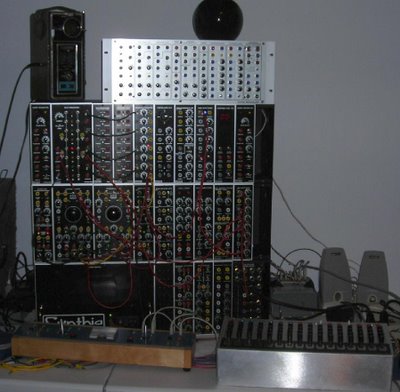 "Here's a quick ditty I came up with last night while messing with the basic FM patch and a TKB: legion_ZO_ditty.mp3 (2.56M)
"Here's a quick ditty I came up with last night while messing with the basic FM patch and a TKB: legion_ZO_ditty.mp3 (2.56M)This is pretty simple (vco driving ZO, LFO driving FM in, two ADSRs) The only thing I'm tweaking is the the one ADSR towards the end and I "play notes" ont he TKB to get the different ...well... "notes" :)
I'm a proud poppa of this creature which I built the past four months or so. Like most children it's cost me my life savings but there are rewards :)"
Title link takes you to Legion's Help Wanted Productions. Check out the groovy monkey shot.
Synton Syrnix - New Flickr Shot
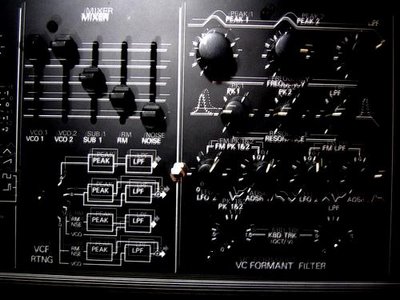 flickr by unrest.
flickr by unrest.Note: Typo in the title of the Flickr shot. It should be Syrinx.
What's cool about this shot is you can actually see the slight detuning of the two Oscillators.
Note the switch in the middle. It's a switch that let's you select LFO1 or LFO2 to modulate the firtst BPF. Title link takes you to the shot with a mouse over the mod.
Thebridechamber
 "We build synthesizer modules and provide various things you'll need to build your own. So far, 4 of our modules are based on the circuit boards of Ken Stone and one module of our own design. Ken Stone is an Australian circuit designer with a versatile and playful frame of mind which is greatly to be praised. We are Bridechamber - what more can we say?"
"We build synthesizer modules and provide various things you'll need to build your own. So far, 4 of our modules are based on the circuit boards of Ken Stone and one module of our own design. Ken Stone is an Australian circuit designer with a versatile and playful frame of mind which is greatly to be praised. We are Bridechamber - what more can we say?"Title link takes you to what more they can say.
via sequencer.de
JoMoX Sunsyn OS Update
 "I have fixed the SunSyn Voice Release cuts of envelope 1 (Filter). On long filter release sounds the voices have been cut prior than 8 voices because the filter envelopes for all other voices were discharged erratically…took me 2 days to find this little but f**ing bug."
"I have fixed the SunSyn Voice Release cuts of envelope 1 (Filter). On long filter release sounds the voices have been cut prior than 8 voices because the filter envelopes for all other voices were discharged erratically…took me 2 days to find this little but f**ing bug."Title link takes you to the details on Sequencer.de.
It's good to see the synth still being supported.
Jörg Schaaf's Studio
Tuesday, August 22, 2006
Analog Days
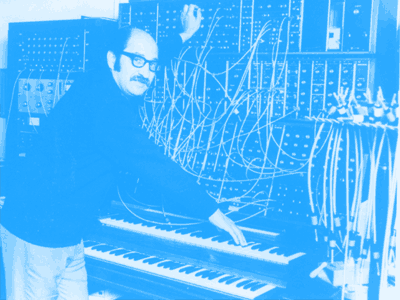 Analog Days seems to be getting a few nods in the comments of this post. I have the book myself but haven't had a chance to get around to it. The general consensus is that it is a great book but there are a few inaccuracies. I've been hoping the authors would come out with an addendum that clarifies them, but I haven't heard of anything to date. I checked the Analog Days website for this but couldn't find anything. If anyone knows where we can find such a list, please post in the comments.
Analog Days seems to be getting a few nods in the comments of this post. I have the book myself but haven't had a chance to get around to it. The general consensus is that it is a great book but there are a few inaccuracies. I've been hoping the authors would come out with an addendum that clarifies them, but I haven't heard of anything to date. I checked the Analog Days website for this but couldn't find anything. If anyone knows where we can find such a list, please post in the comments. Also, someone posted a link to an interview with Trevor Pinch, one of the authors of the book, on ABC Radio National. It's worth a read when you have the time. In the interview they state the theremin was used in the Beach Boys Good Vibrations. It was actually an electro-theremin.
BTW, if you are thinking of picking up a copy of Analog Days, here's a link: Analog Days on Amazon : )
Update: I remember putting up a post on Analog Days before. I checked my archives and found the post on August 23, 2005, exactly one day short of an entire year from this post. Funny. Anyway, there was mention of the inaccuracies in that post (this is a quote from AH, not me in the post): "It's also said to contain a lot of B.S. with attributions to people who simply didn't do certain things the author says they did. For one, Dan Wyman who ran SoundArts in L.A. in the 70s, and who WROTE the Moog modular manual, was quite ticked-off when he read the book and saw so many historical inaccuracies."
We need this list...
Updates via the comments:
via Peter Kirn:
"It's difficult to get interviews with Wendy Carlos, I know that, but I agree. I mean, in general, the writing isn't great by any stretch, and it doesn't feel comprehensive -- I would have liked to see more discussion beyond Moog, for one -- and there are inaccuracies.
But having said all that, you'll still want to read it, and you'll still have a great time with it. I think we need a new book now, mainly! And there's a lot of the roots of electronic music that just don't get told at all; the whole history of the 40s and 50s gets pretty much lost."
via anonymous:
"You can toss pretty much the entire section on Wendy Carlos. The amount of editorializing was nauseating and brings the credibility of the entire book into question. Yet, this wingnut is making money talking to radio progams around the world, telling her story for her. Jackass."
Via Anon:
"Beyond inaccuracies (of which I noted a few), the authors of Analog Days sometimes sound like grad students in psychology. Even so, the book is worth the read for the story - the general arc of the story is true and I haven't seen so much of the story presented in one place anywhere else.
For example, who would have thought that the success of the Moog synthesizer was tied in any way to Taco Bell?"
Aries Modular Track
Title link takes you to the track by kkissinger on electro-music.com. If you like Switched On Bach by Wendy Carlos, you should like this. BTW, if the post on electro-music dissapears over time, post a comment and I post a back-up. Not sure how long they keep their posts.
Moog Tribute by Simon James aka Corky Burger on CDM
Title link takes you to the post and mp3 on CDM.
Track list:
Walter Carlos, Spring, Columbia Records
Richard Hayman, The Windmills of Your Mind, Command records
Walter Carlos, Sinfonia to Cantata no 29, CBS
Tomita, The Earth – A Hollow Vessel, RCA
Gershon Kingsley, Did You Ever Take a Journey, Audio Fideltiy Records
Chris Swanson, Snow, n/a
Dick Hyman, The Minotaur, Command
Circulus, My Body is Made of Sunlight, Rise Above Records
C&K Vocal, Generace, Supraphon
Emerson Lake and Palmer, Lucky Man, Island
The Moog Machine, Aquarius/Let the Sunshine in, CBS
Marty Gold, Day Tripper, AVCO Embassy
Hugo Montenegro, You Got it Bad Girl, BMG
Clara Rockmore, Swan, n/a
Walter Carlos, Winter, Columbia Records
Dick Hyman, The Moog and Me, Command records
Devo, Mongoloid, Warner
Herbie Hancock, Earth Beat, CBS
Klaus Schulze, Mind Phaser, Bomb Records
Weltklang Electronic Music
 Title link takes you there. Scroll down the left column when you get there for more shots. Nice PPG in this shot.
Title link takes you there. Scroll down the left column when you get there for more shots. Nice PPG in this shot.via sequencer.de
The $500 Buchla
Title link takes you to a bit of Buchla history.
Excerpt:
"In contrast to Moog's industrial stance, the rather counter-cultural design philosophy of DONALD BUCHLA and his voltage-controlled synthesizers can partially be attributed to the geographic locale and cultural circumstances of their genesis. In 1961 San Francisco was beginning to emerge as a major cultural center with several vanguard composers organizing concerts and other performance events. MORTON SUBOTNICK was starting his career in electronic music experimentation, as were PAULINE OLIVEROS, RAMON SENDER and TERRY RILEY. A primitive studio had been started at the San Francisco Conservatory of Music by Sender where he and Oliveros had begun a series of experimental music concerts. In 1962 this equipment and other resources from electronic surplus sources were pooled together by Sender and Subotnick to form the San Francisco Tape Music Center which was later moved to Mills College in 1966.
Because of the severe limitations of the equipment, Subotnick and Sender sought out the help of a competent engineer in 1962 to realize a design they had concocted for an optically based sound generating instrument. After a few failures at hiring an engineer they met DONALD BUCHLA who realized their design but subsequently convinced them that this was the wrong approach for solving their equipment needs. Their subsequent discussions resulted in the concept of a modular system. Subotnick describes their idea in the following terms:
'Our idea was to build the black box that would be a palette for composers in their homes. It would be their studio. The idea was to design it so that it was like an analog computer. It was not a musical instrument but it was modular...It was a collection of modules of voltage-controlled envelope generators and it had sequencers in it right off the bat...It was a collection of modules that you would put together. There were no two systems the same until CBS bought it...Our goal was that it should be under $400 for the entire instrument and we came every close. That's why the original instrument I fundraised for was under $500.'
Buchla's design approach differed markedly from Moog. Right from the start Buchla rejected the idea of a "synthesizer" and has resisted the word ever since. He never wanted to "synthesize" familiar sounds but rather emphasized new timbral possibilities. He stressed the complexity that could arise out of randomness and was intrigued with the design of new control devices other than the standard keyboard. pp39-40"
Anyone else thinking Starkey? Coincidentally the recent Starkey went for $541 on the bay. Yeah, I know I'm stretching it...
via Peter Grenader on AH.
Excerpt:
"In contrast to Moog's industrial stance, the rather counter-cultural design philosophy of DONALD BUCHLA and his voltage-controlled synthesizers can partially be attributed to the geographic locale and cultural circumstances of their genesis. In 1961 San Francisco was beginning to emerge as a major cultural center with several vanguard composers organizing concerts and other performance events. MORTON SUBOTNICK was starting his career in electronic music experimentation, as were PAULINE OLIVEROS, RAMON SENDER and TERRY RILEY. A primitive studio had been started at the San Francisco Conservatory of Music by Sender where he and Oliveros had begun a series of experimental music concerts. In 1962 this equipment and other resources from electronic surplus sources were pooled together by Sender and Subotnick to form the San Francisco Tape Music Center which was later moved to Mills College in 1966.
Because of the severe limitations of the equipment, Subotnick and Sender sought out the help of a competent engineer in 1962 to realize a design they had concocted for an optically based sound generating instrument. After a few failures at hiring an engineer they met DONALD BUCHLA who realized their design but subsequently convinced them that this was the wrong approach for solving their equipment needs. Their subsequent discussions resulted in the concept of a modular system. Subotnick describes their idea in the following terms:
'Our idea was to build the black box that would be a palette for composers in their homes. It would be their studio. The idea was to design it so that it was like an analog computer. It was not a musical instrument but it was modular...It was a collection of modules of voltage-controlled envelope generators and it had sequencers in it right off the bat...It was a collection of modules that you would put together. There were no two systems the same until CBS bought it...Our goal was that it should be under $400 for the entire instrument and we came every close. That's why the original instrument I fundraised for was under $500.'
Buchla's design approach differed markedly from Moog. Right from the start Buchla rejected the idea of a "synthesizer" and has resisted the word ever since. He never wanted to "synthesize" familiar sounds but rather emphasized new timbral possibilities. He stressed the complexity that could arise out of randomness and was intrigued with the design of new control devices other than the standard keyboard. pp39-40"
Anyone else thinking Starkey? Coincidentally the recent Starkey went for $541 on the bay. Yeah, I know I'm stretching it...
via Peter Grenader on AH.
Xpantastic ! - New Oberheim XPander Group
 It's XPantastic! Like the name? : ) Title link takes you to the new Yahoo! Group. If you have an XPander or Matrix-12 or are interested in them, feel free to join. I have no affiliation with the list. I just know the old Xpansions list seems to have dissapeared and somone created this one. BTW, if you know what happened to the Xpansions list, please comment. I think I'm subbed to it, but I'm no longer sure. : ) I haven't received an email in probably over a year, so... Not sure if I unsubbed and forgot or if it just died.
It's XPantastic! Like the name? : ) Title link takes you to the new Yahoo! Group. If you have an XPander or Matrix-12 or are interested in them, feel free to join. I have no affiliation with the list. I just know the old Xpansions list seems to have dissapeared and somone created this one. BTW, if you know what happened to the Xpansions list, please comment. I think I'm subbed to it, but I'm no longer sure. : ) I haven't received an email in probably over a year, so... Not sure if I unsubbed and forgot or if it just died.
Sequential Circuits Studio 440
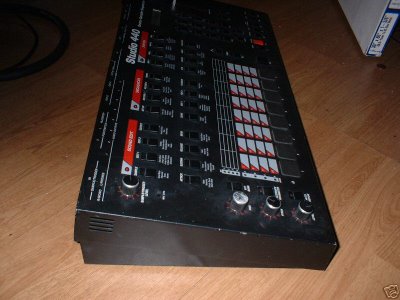 Title link takes you to shots pulled from this auction.
Title link takes you to shots pulled from this auction.Rare sampling drum machine with analog filters by Sequential Circuits. More on VSE.
via Matt
PREVIOUS PAGE
NEXT PAGE
HOME













© Matrixsynth - All posts are presented here for informative, historical and educative purposes as applicable within fair use.
MATRIXSYNTH is supported by affiliate links that use cookies to track clickthroughs and sales. See the privacy policy for details.
MATRIXSYNTH - EVERYTHING SYNTH













© Matrixsynth - All posts are presented here for informative, historical and educative purposes as applicable within fair use.
MATRIXSYNTH is supported by affiliate links that use cookies to track clickthroughs and sales. See the privacy policy for details.
MATRIXSYNTH - EVERYTHING SYNTH

